How to plant and care for viburnum?
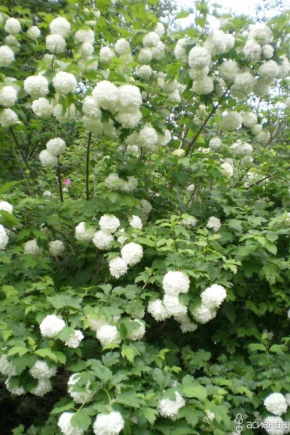
Kalina is characterized by a rich useful composition, therefore it is used in the treatment of various ailments. Many gardeners want to have this plant on their site. To successfully plant and grow a healthy tree, you need to have a stock of certain knowledge. How to plant and care for viburnum will be discussed in the article.
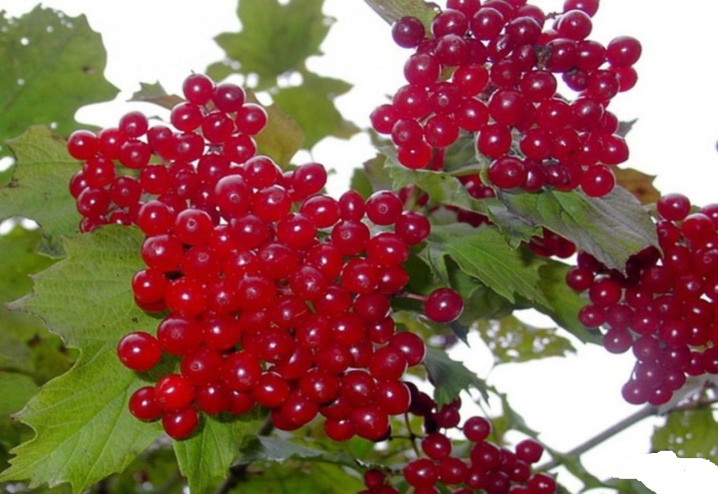
How to choose a seat?
Viburnum is a woody flowering plant from the adox family. Under natural conditions, this representative of the flora is distributed in the Northern Hemisphere - in the Andes, Madagascar and the Antilles. The fruits of the culture are red berries with a rich vitamin composition. Planting a tree near the house, in the garden or in the summer cottage presents no difficulties. Currently, viburnum is considered a popular crop, which is planted on their plots no less often than apples, cherries, pears and plums.
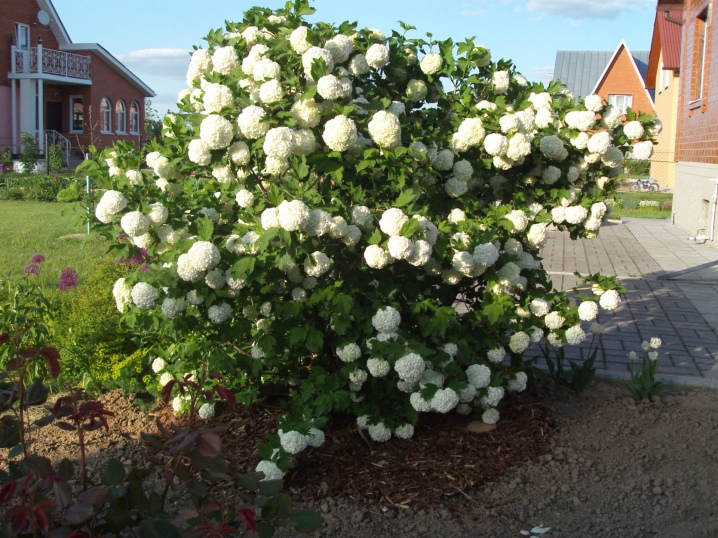
An unpretentious culture can grow in the sun, but prefers a semi-shaded area. Viburnum is considered an unpretentious representative of the flora in relation to the soil. The best option for it is a neutral, slightly acidic soil.
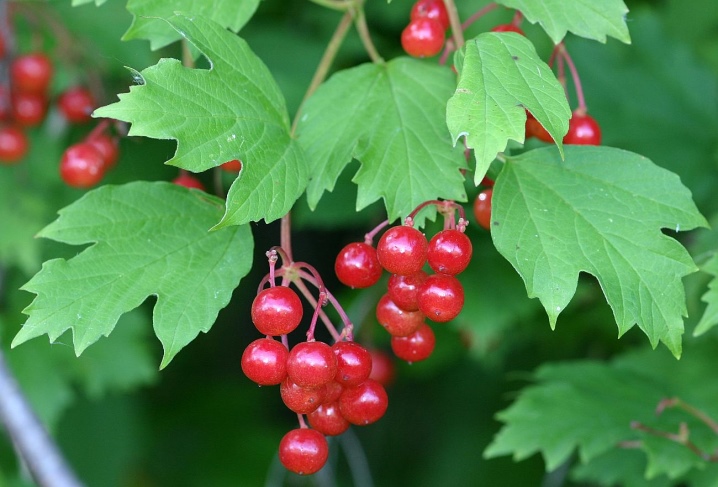
If the substrate is sandy or sandy loam, then it should be fertilized before planting.
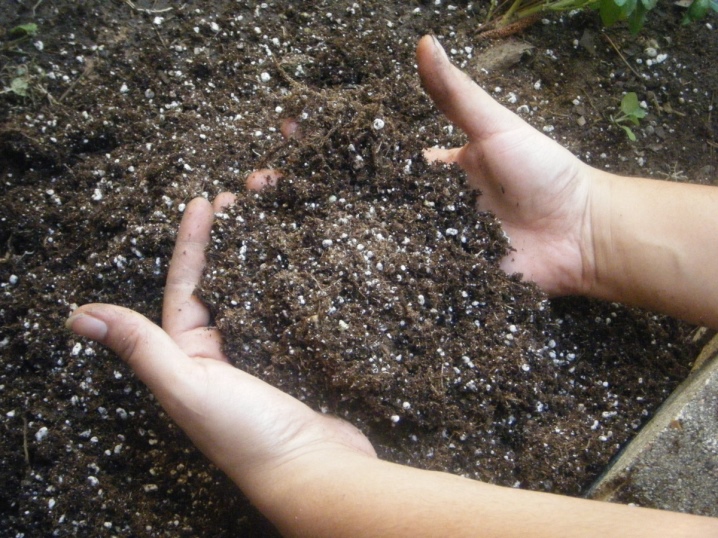
Despite the moisture-loving nature, the culture can get sick from excessive moisture. Groundwater should lie no closer than 100 centimeters from the soil level. With the help of viburnum plantations, you can form a hedge. Beautiful bushes can become a real decoration of the territory. If you plant a viburnum next to an unattractive fence, then it will certainly mask all the flaws and make the picture live.
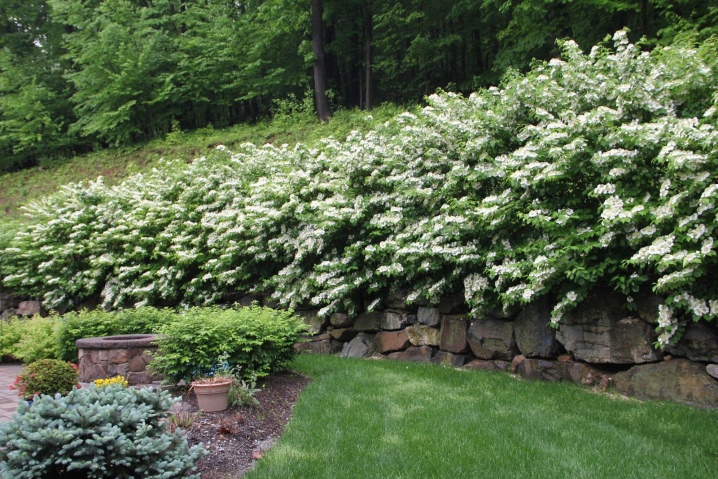
Features of planting and transplanting in open ground
You can plant a decorative viburnum or transplant it to another new place in autumn or spring. Varieties "Benjamin", "Sargent" and others can be propagated by seeds and cuttings both in Siberia and in other regions of the country.
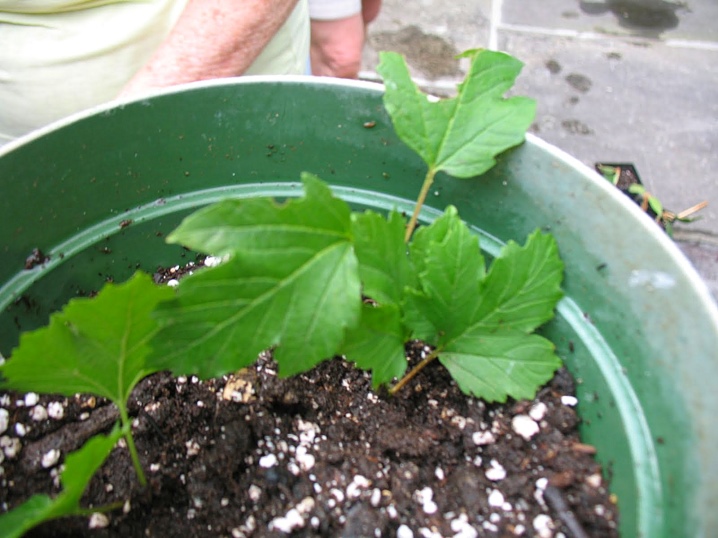
Summer
Planting viburnum with cuttings in the summer is considered a common agricultural technique. Planting material should be prepared in advance by pruning a perennial faded bush. From a young shoot, it is worth cutting off parts 15 centimeters long, on which there are a couple of leaves. Cuttings from an adult plant should be soaked in advance in a stimulating substance, and then planted in the ground in a small greenhouse.
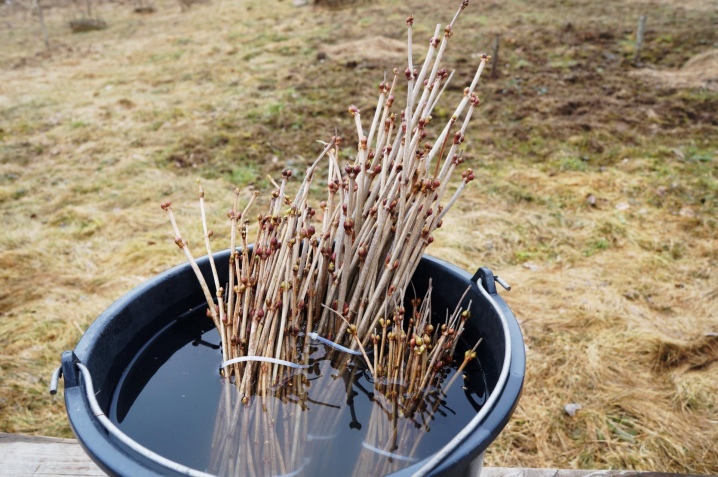
A homemade mini-greenhouse must be covered with polyethylene from above. Cuttings that take root should be gradually hardened by regularly opening the film. Thus, fresh air will enter the greenhouse, which will prepare the plantings for future planting in open ground.
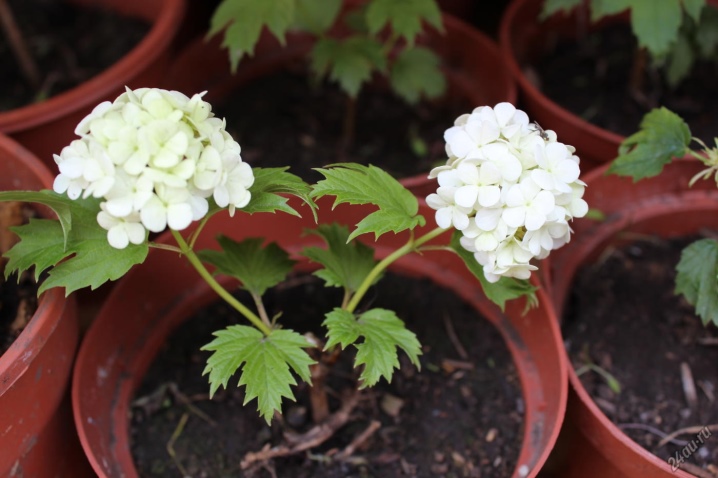
In autumn
The algorithm for planting viburnum in open ground in the fall is no different from the spring. It is worth planting a plant after the foliage has fallen and before the onset of the first frost.
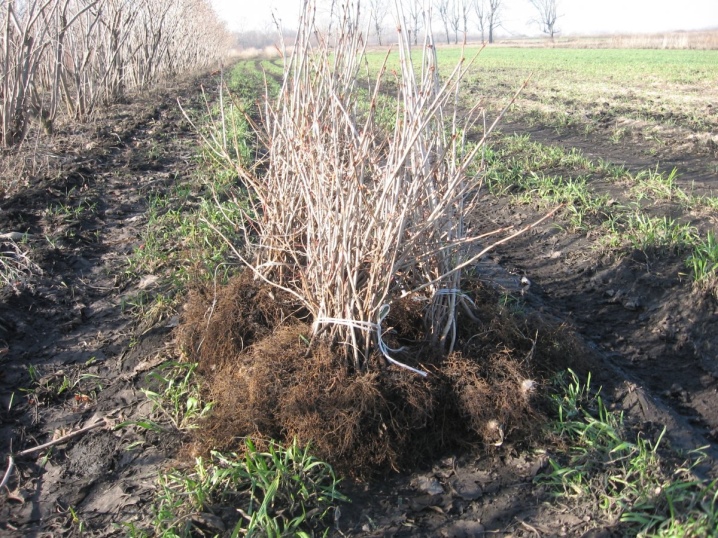
In the spring
In the spring, the viburnum bush can be planted or transplanted only before the leaves begin to bloom on it. The size of the planting hole should be 50 by 50 by 50 centimeters. In the case of planting several crops, it is worth observing the distance between them from 250 to 350 centimeters.
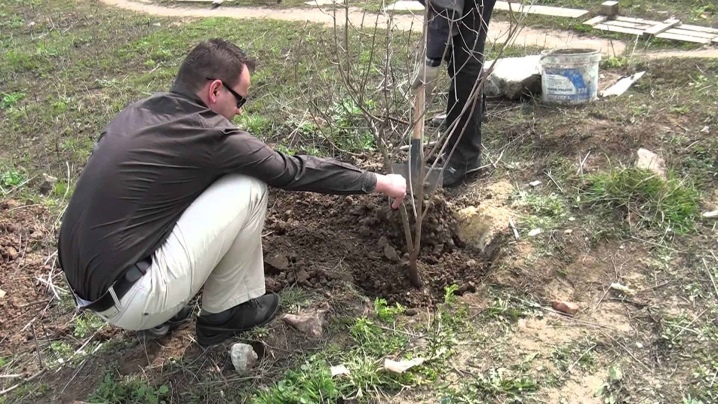
When preparing the pit, the top soil layer must be folded back separately. After that, it should be mixed with a bucket of peat or humus and 2 glasses of nitrophoska. Next, 2/3 of the resulting mixture must be poured into the hole, and 40 liters of water must be poured there. For planting, 3-year-old seedlings are best suited. Their root system must be spread out and installed on the formed hill.
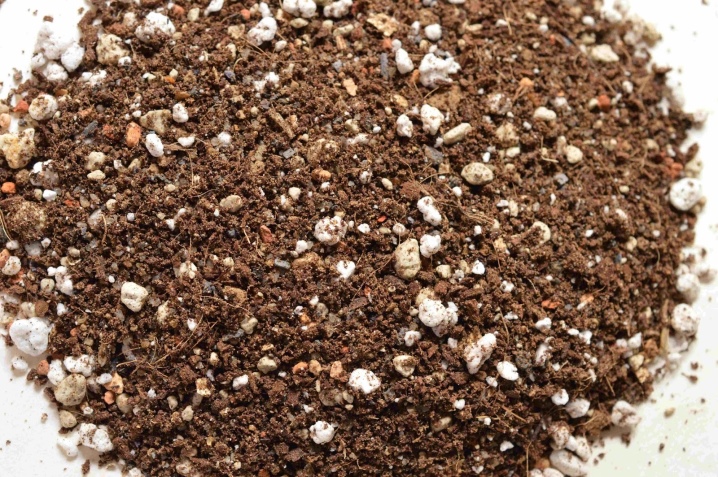
The next step is to fill the planting hole with the rest of the soil mixture. The trunk circle is carefully tamped and watered abundantly. After absorbing the liquid, it is recommended to mulch from peat, compost and humus. The gardener should not forget that after the planting procedure, the root collar of the viburnum should be buried in the ground by about 0.5 centimeters.
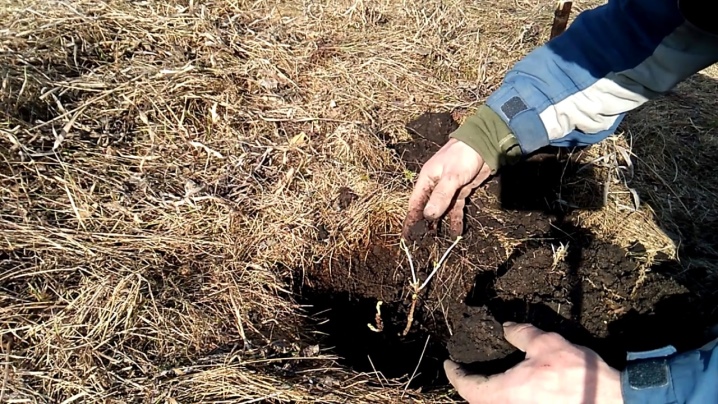
Reproduction of viburnum with seeds is less effective, but still possible. The planted planting material begins to germinate only after 7 months of stratification. The next year, in the spring, you can see the appearance of cotyledons. Gardeners should remember that the first 12 months after sowing the seeds, the area with plantings should be covered with fallen leaves.
If the seeds are sown in autumn, then they will germinate only after a year. The first 2 years, the growth of the culture is rather slow.
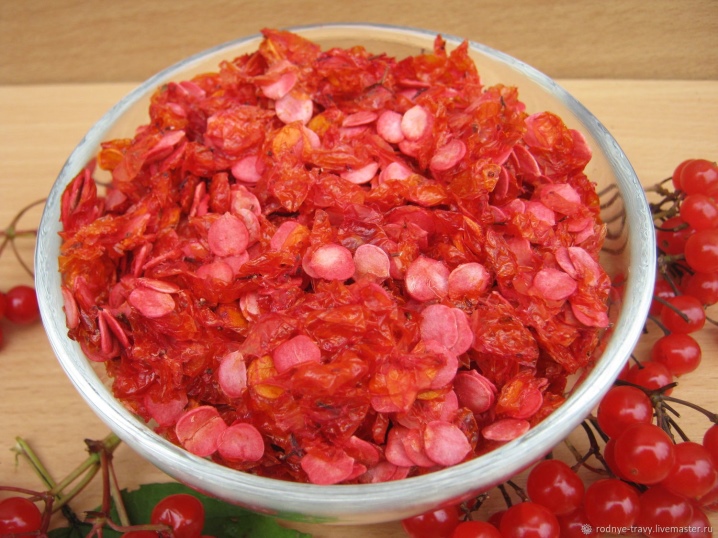
Care rules
Viburnum is an unpretentious plant, but it requires basic care rules. In order to grow a healthy plant, you do not need to spend a lot of effort, time, so even a novice gardener can cope with the process. It is necessary to take care of the crop in the country or in the personal plot correctly, regularly performing processing, watering, pruning, feeding.
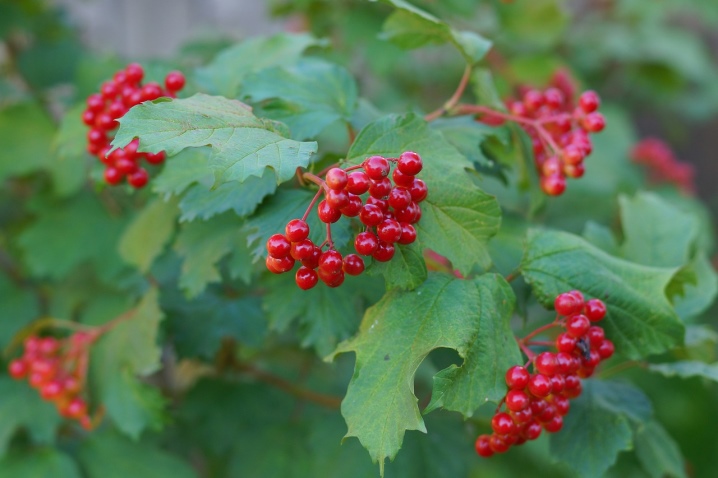
Treatment
All garden plants suffer from diseases and pests from time to time, and viburnum is no exception. For the safety of the crop, it will be necessary to carry out regular preventive spraying in the spring and autumn. Insecticides must be used to kill parasites. To eliminate fungal ailments, it is recommended to treat the bush with fungicides.
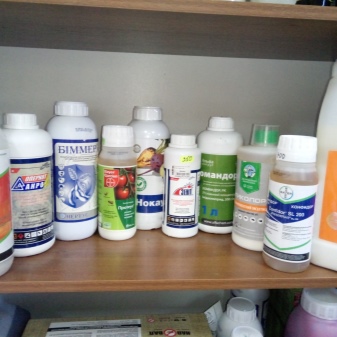

Diseases of a bacterial and viral nature are not eliminated. Gardeners should remember that all kinds of insects are capable of carrying diseases, so viburnum should be regularly treated against pests.
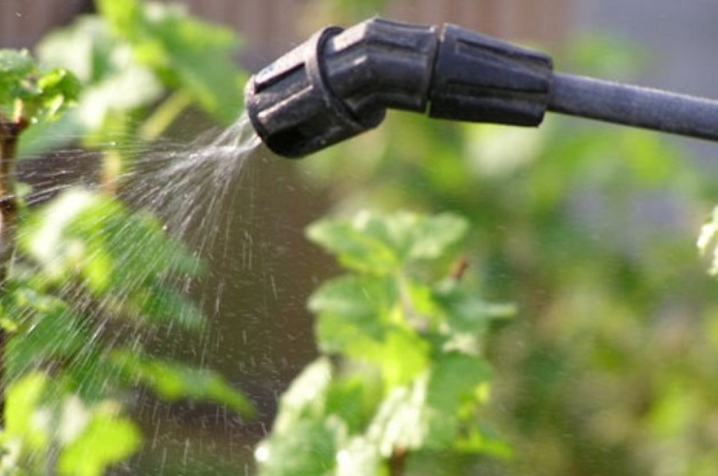
Watering
It is necessary to irrigate the viburnum bush regularly, 1 watering after 7 days is considered sufficient. Do not forget about irrigating the plant in dry, hot weather. Pour from 30 to 40 liters of liquid under one bush. A young representative of the flora does not need much water, but watering should be carried out once a week.
If it often rains in summer, then there should be less irrigation. However, you need to know that viburnum is a moisture-loving culture, so long breaks and overdrying of the soil should not be allowed.
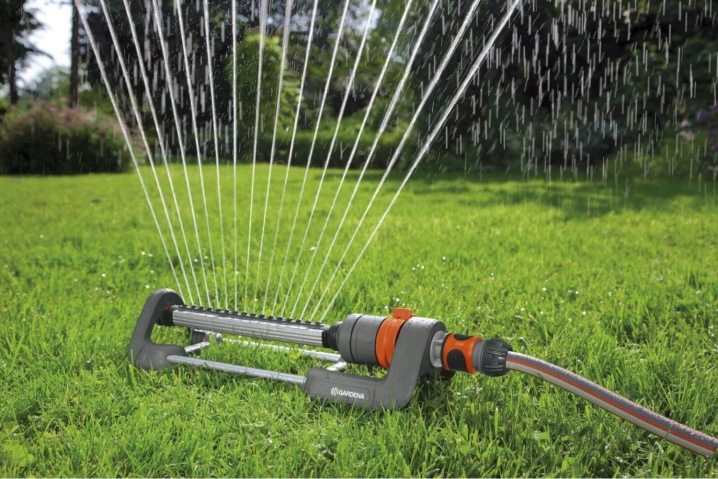
Top dressing
Due to the fact that the healing bush requires frequent watering, it must be fertilized with dry dressings. Fertilizers should be evenly distributed over the surface near the trunk circle. After the procedure, the culture should be watered. The first feeding is carried out in the spring when opening the leaves: at this time, 2 tablespoons of urea should be poured under each plant. Such a procedure is necessary only if the bush was not fed with this substance by the kidneys in a dormant state.
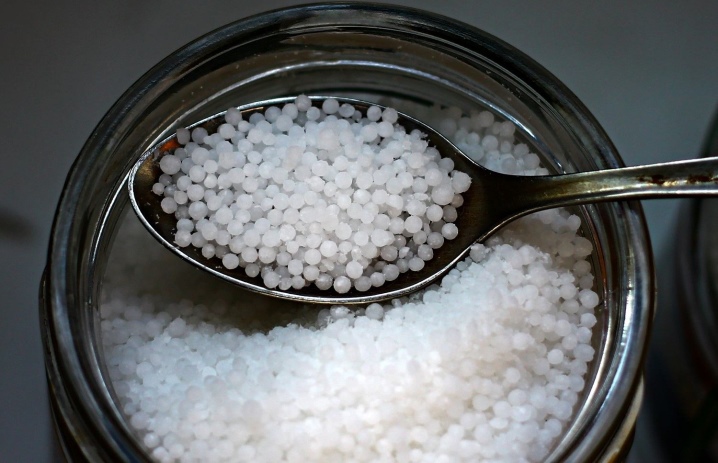
The second time, fertilizing is applied during the flowering culture. In this phase, the culture needs substances containing potassium. Under each plant, you need to add 2 large tablespoons of potassium sulfide or 0.5 liters of wood ash. The third procedure for fertilizing the viburnum is carried out after it has faded. To do this, 2 large spoons of nitroammophoska are poured under each culture.
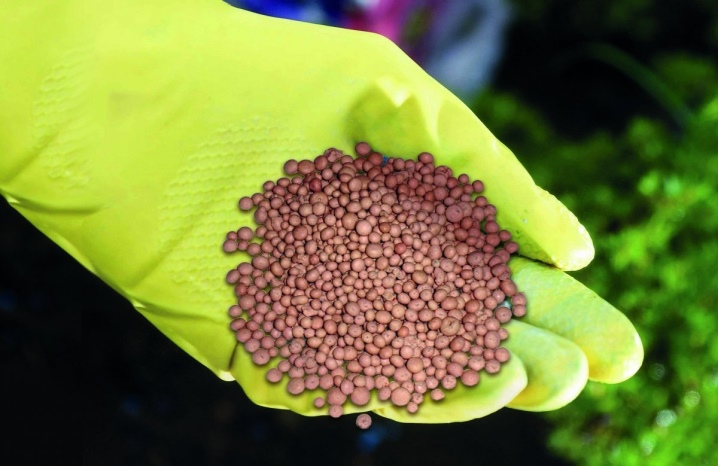
The viburnum needs the last feeding only if its near-stem circle was not covered with an organic layer before the winter period. To fertilize the bush, a solution is required, which includes a bucket of water, 2 large tablespoons of superphosphate, potassium sulfide.

One plant needs about 20 liters of mixture.
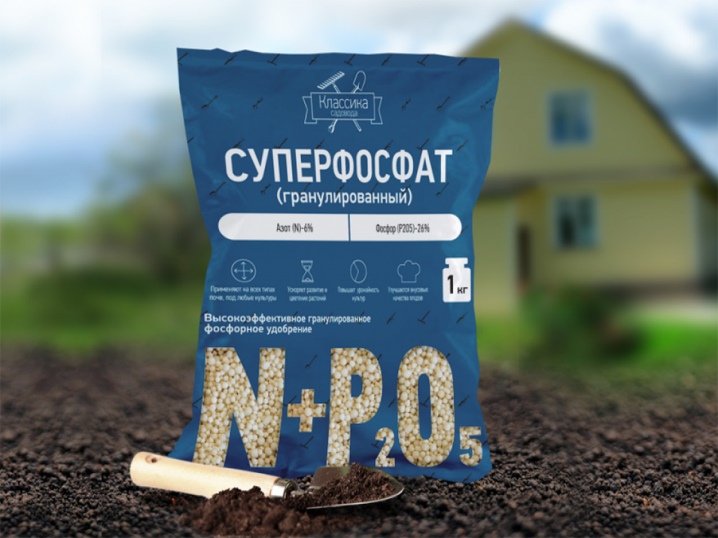
Pruning
Kalina must be cut off in the first spring days, before the juice begins to move. It is possible to carry out a haircut in the autumn period after the foliage has fallen off. However, experts recommend making rejuvenating and shaping pruning exclusively in the spring, and for sanitary purposes, shearing the plant in the fall.
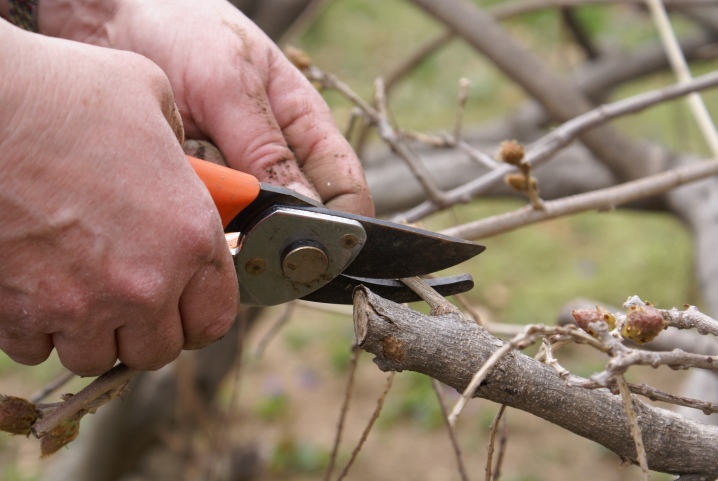
Under natural conditions, viburnum can be presented in the form of a tree or a bush, so it is worth forming its crown accordingly. Before the start of sap flow, the culture is sheared for a sanitary purpose, and after that - with a formative one. If you want the viburnum to grow in the form of a tree, you need to leave 1 vertical branch, and cut the rest into a ring. The kidneys at the bottom of the trunk, where the stem will be located, are removed.
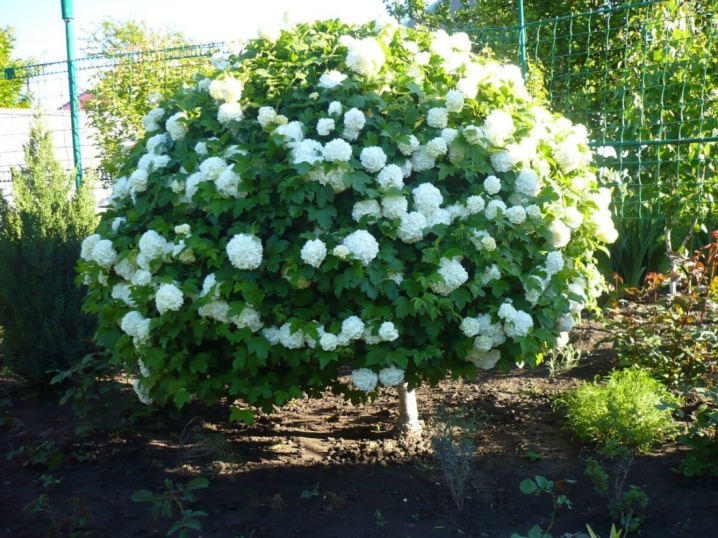
It takes about three years to remove the trunk. When the culture reaches a height of 150-200 centimeters, it is required to pinch the growth point. This procedure stimulates the branching of the plant. Throughout the entire time, it will be necessary to eliminate the growth near the roots, otherwise the result will be a shrub. Do not forget about maintaining the standard cleanliness by removing side shoots.
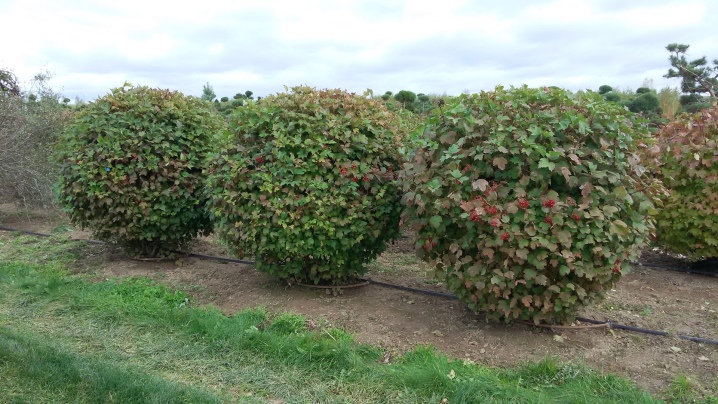
Regardless of the desire to grow a bush or tree, pruning viburnum will be required in any case. Without this procedure, the crown of the culture will grow and become thicker, which will complicate the collection of berries, worsen the quality of the fruits, and reduce their quantity. It is definitely worth pruning rival branches, as well as shoots that grow inward or incorrectly. When the need arises to rejuvenate the culture, it is worth cutting off the old shoots. At this time, only the most developed branches are left near the roots.
By the second year of the viburnum's life, it is necessary to replace another third of the obsolete branches, and by the third - the remaining third. A rejuvenating haircut of a tree culture is carried out in a similar way to other fruit trees.
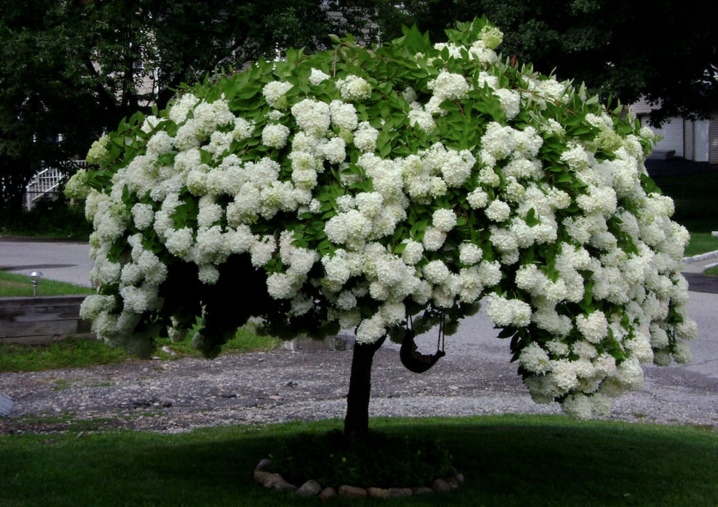
After the plant has shed all its leaves and is dormant, fall sanitary pruning can begin. In this case, it is worth removing all broken, dry branches damaged by parasites or ailments. If the cut is more than 7 millimeters in diameter, then it must be treated with garden varnish. Sanitary pruning is best done on a dry, warm fall day.
To form a bush from a young viburnum, it will not be necessary to cut down old trunks, to form an equidistant frame. The result of the efforts can be seen only after the passage of 3 years.
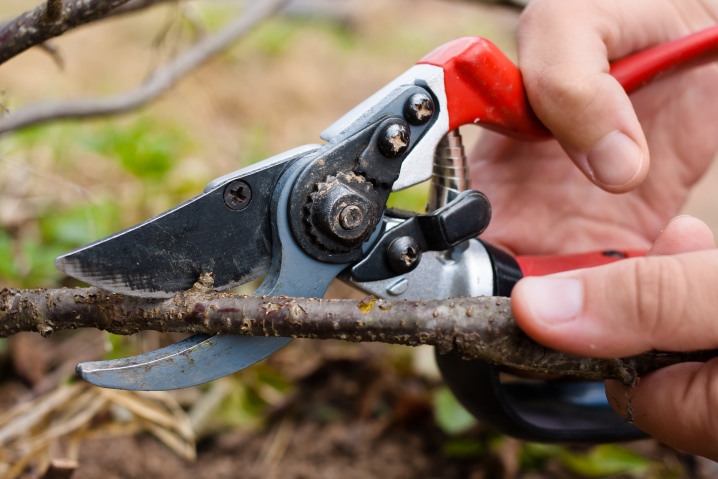
There are a number of activities that need to be carried out from the first year of the life of a culture.
- After planting a young bush in open ground, you need to cut off all the shoots from it, leaving from 3 to 4 buds. The cut should be done at an angle of 45 degrees.
- In the summer, in the first year of life, it is worth shortening the shoots that have grown, and their processes. The length from the roots should not exceed 0.45 meters. If the tip is longer, then it is cut off.
- In the fall, a single viburnum will begin to appear undergrowth near the roots. It should be cut out by placing from 5 to 7 branches, which will later become frame trunks.
- For the next spring, the frame trunks left earlier will need to be shortened, leaving a length of 0.3, 0.4 or 0.5 meters.
- The last two steps must be repeated every year until a bush with the desired shape and size is formed.
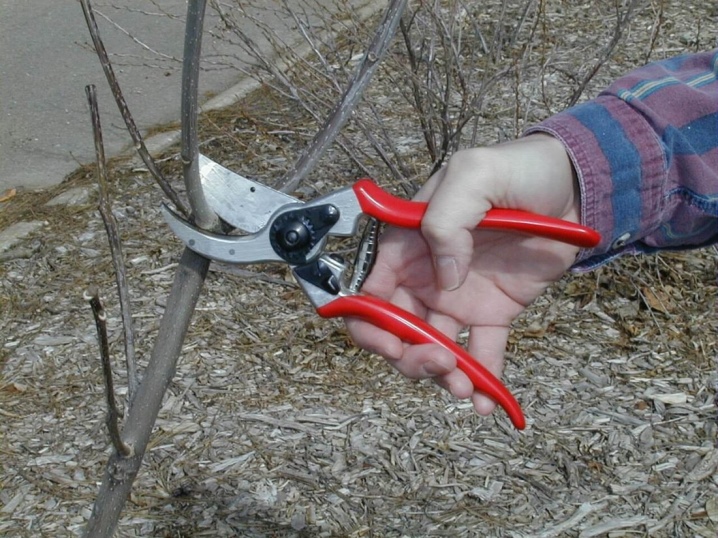
Possible growing problems
For novice gardeners in the Moscow region and other regions, information about the possible difficulties that arise when growing viburnum is very important. The most common problem is the damage to the plant by pests and diseases that can be eliminated with the help of special means. In a situation where the culture does not give inflorescences, it is worth considering whether the choice of the planting site has been made correctly. When growing a plant in a shaded area, its decorative effect may suffer. Drought or severe winters can also result in the absence or reduction of buds on the bush.
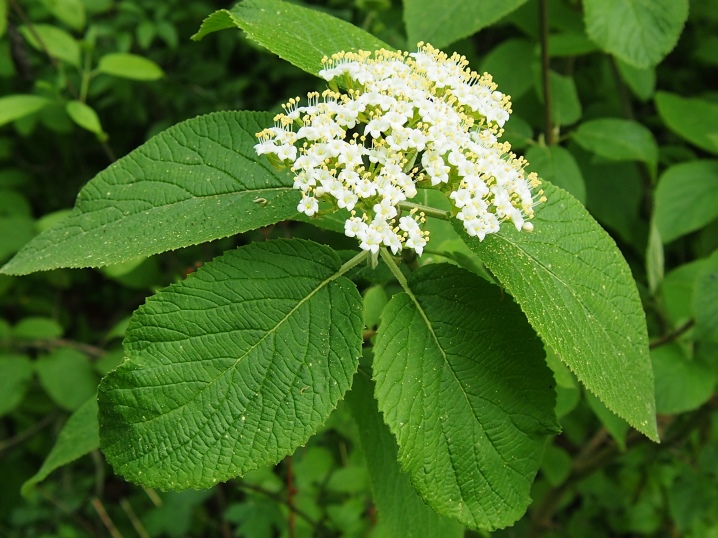
Experienced gardening tips
- with an invasion of ants on viburnum, it is worth treating it with an insecticide;
- at the end of the leaf fall, all fallen leaves should be removed in conjunction with the old layer of mulching;
- after the stem of the culture is formed, it must be tied up in order to avoid damage in case of strong gusts of wind;
- during the summer period, at least two hilling should be carried out.
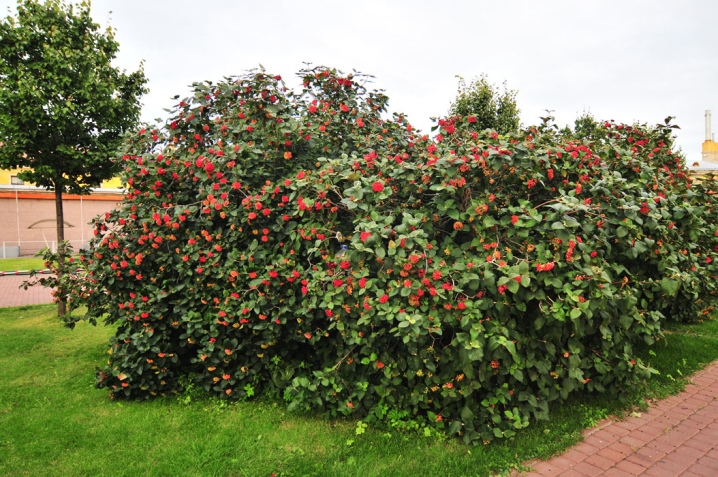
Almost everyone can grow a viburnum bush on their own plot. Culture can become not only a worthy decoration of the garden, but also a source of essential elements for the human body. The beneficial substances of viburnum berries can help with colds, insomnia, and hypertension. The berries of this plant should be picked after the first frosty days and stored in a grated, frozen or dried form.
More information about planting and caring for viburnum can be found in the video below.



































































The comment was sent successfully.